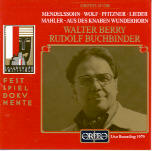This recital of songs from the 1979 Salzburg Festival is a delight. Walter Berry was a baritone known and loved less for the beauty of his voice than for its expressiveness and the manner in which he colored it to suit whatever text he sang. This program begins with four easy-to-take, folksy songs by Mendelssohn. After Berry gets us comfortable, he instantly changes the mood with three despair-filled songs by Hugo Wolf. More dreariness follows in a quartet of songs by Pfitzner. But the program’s real meat-and-potatos comes with six songs from Mahler’s Das Knaben Wunderhorn, a sequence that lasts as long as the three previous song sets and takes us through all of those emotions and more. Berry is known for his Mahler and it’s easy to see why: Like the great composer, he can charm us and disturb us at will, inviting us into St. Anthony’s world as wholly as that of the soldier. Encores by Mahler and Wolf round out the program. Rudolf Buchbinder accompanies aggressively when needed (in “Revelge”, for instance), but can murmur as well. The sound is excellent.
































